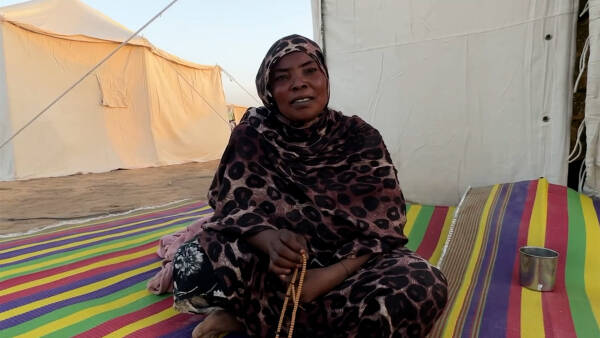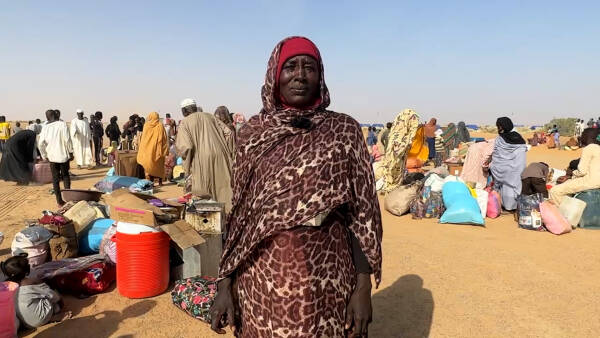Women of Al-Fashir: Displacement, Genocide, Pain, Survival, and Unbroken Resilience
After the(RSF) took control of Al-Fasher, women and children found themselves on a journey of displacement fraught with death, hunger, and torture, turning their suffering into a bloody testimony to a systematic campaign of ethnic cleansing.

Mervat Abdel Qader
Sudan — After enduring over two years of siege, hunger, and disease, showing remarkable patience and resilience, the women of Al-Fasherhad been holding out hope for a dawn of victory over war and death. Yet, fate had other plans. They were forced to flee Al-Fasherunder humiliation and great hardship after the RSF took control of the city and the Sudanese army withdrew—leaving them to face their grim fate.
A Perilous Journey of Displacement
In a weeks-long escape, the women of Al-Fasherin western Sudan fled with their children, burdened with hunger, illness, and fear after witnessing massacres too horrific for the human mind to bear.
According to the International Organization for Migration (IOM), more than 81,000 people have been displaced from Al-Fasherand its surroundings in North Darfur since October 26, most of them women, children, and the elderly, following the RSF’s declaration of control over the city. The force has been accused of committing violations against civilians in all areas under its control.
The organization noted that field teams reported extreme insecurity along the roads, hindering movement, and that the situation remains volatile and tense, with continuous displacement and insecurity.
After an arduous and dangerous journey—during which most young men captured by the RSF were executed on ethnic grounds—the displaced, mainly women, children, and the elderly, arrived in Al-Dabba in Northern State, physically exhausted, wounded from the difficult path, and bearing marks of torture inflicted by RSF fighters.
In makeshift tents far from the city—known for its biting cold—the displaced have settled. The tents are bare, without beds, their occupants sleeping on the ground, surviving only through the generosity of donors providing food, water, and basic necessities.
Our agency visited the displaced women, who recounted horrific stories—scenes not from a movie script but of real violence and torture they endured. Some refused to speak on camera, still gripped by fear and distrust of everyone around them.
Ethnic-Based Killings and Violations

Hanan Adam Ismail bravely shared part of her ordeal, though she chose silence on some of the most painful details. She recounted that on the day the RSF seized Al-Fashir, she fled with her children, carrying her sick daughter. Along the way, RSF fighters stopped her, beating, insulting, and torturing her in front of her children. Their rage extended to the little ones, whom they also beat mercilessly before letting the family go.
She continued her journey to a small nearby village, where she stayed for twenty days tending to her and her children’s wounds—both physical and emotional—trying to help them forget the brutality they had witnessed and to instill hope for a better future.
But as they attempted another escape, RSF forces intercepted them again, subjecting them to more violence, theft, and an attempt on their lives. Carrying her ill daughter, Hanan continued walking for several days until she reached Northern State.
The RSF has reportedly carried out acts of genocide and ethnic cleansing, as evidenced by multiple videos circulating on social media showing the forces celebrating the killing of large numbers of civilians, particularly those with dark skin, and burning entire villages.
According to a statement by the Sudanese Doctors’ Network, the RSF has been accused of committing genocide in Al-Fashir. The statement reported that the RSF gathered hundreds of bodies from streets and neighborhoods, burying them in mass graves and burning others to conceal the crimes against civilians.
Villages Emptied and Burned

Manal Ibrahim, one of the survivors of the massacre in the village of Shagra, north of Al-Fashir, said that RSF forces raided the village, looted civilians’ property, expelled residents by force, and then set the entire village on fire, killing those who remained inside.
She added that after her village was burned, RSF forces continued to pursue them—burning and killing in every village they reached. After several such incidents, they finally managed to escape from North Darfur to Al-Dabba in Northern Sudan after a grueling, days-long journey on foot without food. Along the way, Manal and others suffered beatings, humiliation, and continuous violations until they left the area.

Asmaa Ahmed, who recently arrived in Northern State after nearly a month of displacement—walking from one region to another—described severe psychological and physical abuse, including verbal humiliation and beatings. She spoke to our agency barely able to stand or speak, shattered by the horrors she had endured, as was the case with most displaced from Al-Fashir.
Sudan’s Minister of State at the Ministry of Social Welfare, Salima Ishaq, confirmed in an official statement that Al-Fasheris experiencing an extremely dangerous humanitarian situation following the RSF’s takeover. She added that the violations committed against women and children amount to systematic ethnic cleansing.
She further confirmed that in the first few days of the RSF’s entry into the city, the forces massacred more than 300 women and documented at least 25 confirmed cases of rape, with other unconfirmed cases still under field investigation
